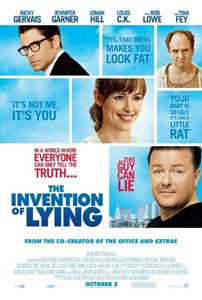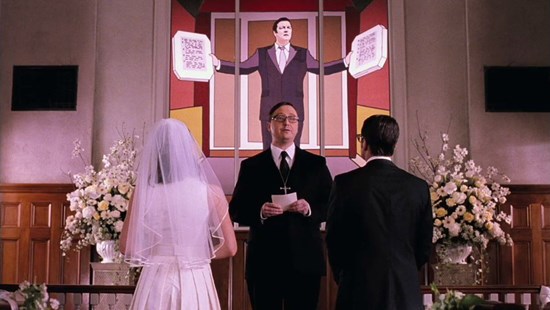
The Invention of Lying premieres at the Toronto International Film Festival next week, so now's as good a time as any to follow up my earlier post on that film.
As Mark noted in his newsletter last week, my earlier post was flooded with comments after Ricky Gervais, the star and co-writer-director of that film, linked to it from his own blog with the simple comment: "And so it starts..."
The "it" in question was, presumably, the "big controversy" that fellow co-writer-director Matthew Robinson hinted the film would cause in an interview with the MTV Movies Blog. My post was an attempt to track the clues, contained in interviews and official publicity materials, as to what that "big controversy" might be – and rather than spell everything out, I presented the clues and hoped the reader would be intrigued enough to put the pieces together for themselves.
And that was it. I didn't make any comment on the film itself, let alone pass any judgment on it, for the obvious reason that I have not seen it yet. But many people saw the word "Christianity" at the top of this blog, and the word "blasphemy" in the headline to that post – co-star Jennifer Garner's word, not mine – and so they leapt to the conclusion that I was somehow protesting the film. Far from it. In fact, I included a YouTube clip of Gervais discussing his atheism at the end of the post (a clip that I discovered while perusing his blog, as it happens) precisely because it wasn't all that negative, and it gave me hope that a constructive conversation around these issues might be possible.
I still have that hope, but in the meantime, it seems I need to spell out more clearly what my earlier post was getting at. So here goes:
1. Punctuation is important. I never said the film was "blasphemy". Rather, in sussing out what the "big controversy" might be, I came across an interview with Garner in which she said she initially hesitated to be part of this movie because her parents might "think it was blasphemy". This seemed like an obvious clue as to the nature of the "big controversy", so I put it in the headline – but in quotes, and with a question mark.
2. Robinson says the "big controversy" will revolve around the Gervais character "inventing something that in a world without lying wouldn't exist". Garner says God doesn't "exist" in the world depicted in this film. And yet, based on the prominence of church-related imagery in the subliminal rapid-fire montage that appears in the middle of the trailer, it would seem that religion does come to exist in this world after all. Is this what the Gervais character invents? Based on the triptych that appears in the shot below, which depicts the Gervais character holding a couple of tablets Ten Commandments-style, it would seem the answer is yes:

3. Many people, including myself, have been eagerly looking forward to this film because we enjoy Gervais's comedy, and also partly because it looked like this film could be a moral fable similar to, say, Liar Liar (which, incidentally, was directed by a Christian, Tom Shadyac). To the extent that the film might be a bit more complicated than that, or to the extent that the filmmakers may be hinting at "big controversies" in anticipation of the film's release, I think it's only fair to give interested viewers a heads-up. But as always, the viewers would need to see the film for themselves before they could form any educated opinions about it.
4. As far as I know, no one involved at CT Movies has seen the film yet – but I have heard from one person who claims to have read the screenplay, and, after describing some of the plot points, that person said the script comes across like a "thinly veiled atheist screed" that owes a lot to the Richard Dawkins brand of atheism. And for what it's worth, the person in question is a self-professed "huge fan of The Office" who found the screenplay "very disappointing". Now, if I had read the script myself, I might have a very different take on it than this person did. And of course, screenplays go through rewrites all the time, and directors have different ways of interpreting those screenplays; just the other day, Hitfix posted an on-set interview with Gervais in which they discussed how Rob Lowe had an "ad-lib about Hell" that Gervais decided not to use. So the finished film could be very different from the script that this person read. But it's something to keep in mind.
5. In a more recent blog post (sorry, there don't seem to be any permalinks), Gervais says, "By suggesting there is no God you are not singling out Christianity." That's certainly true as far as it goes. And certainly, any religion invented by Gervais's character in this film would not be identical to any religion in the real world. That being said, fictitious religions do borrow many of their bits and pieces from real-world religions, and nearly every identifiable bit of religious iconography glimpsed in this film so far seems to borrow from the Christian tradition. Not as extensively as, say, The Golden Compass, perhaps, but still.
6. In that same post, Gervais also says, "Not believing in God cannot be blasphemous. Blasphemy is acknowledging a God to insult or offend etc." For what it's worth, I sort of agree. As G.K. Chesterton once put it, "Blasphemy itself could not survive religion, if anyone doubts that let him try to blaspheme Odin." And as Terry Jones notes in the commentary for Monty Python's Life of Brian – one of my favorite films of all time, by the way – there is a difference between "blasphemy", which is the mockery of a god, and "heresy", which is the subverting of a traditional belief about that god. That being said, even if one does not acknowledge the existence of any given god, I think one can still acknowledge another person's belief in that god and insult or offend that belief, knowing that it will come across as blasphemy to the person who holds that belief. But of course, we won't know whether or not this film does that until we have had a chance to see it for ourselves.
7. Finally, I fully support Gervais's right to believe what he wants and make whatever film he wants; in fact, one of my atheist friends and I sometimes grumble about how Hollywood is too wussy to make films that clearly embrace either of our viewpoints, and when I first gathered what The Invention of Lying might be all about, a part of me wondered if – and even hoped that – my friend might like it. (You don't have to agree with someone's beliefs in order to empathize with their desire to feel "represented" onscreen.) What's more, we're all about encouraging dialogue here at CT Movies, and in the past we have interviewed such atheists as Philip Pullman (author of The Golden Compass) and Brian Flemming (director of The God Who Wasn't There). If an opportunity to speak with Gervais or one of his fellow filmmakers came along, we'd be game, for sure.

Support Our Work
Subscribe to CT for less than $4.25/month




















